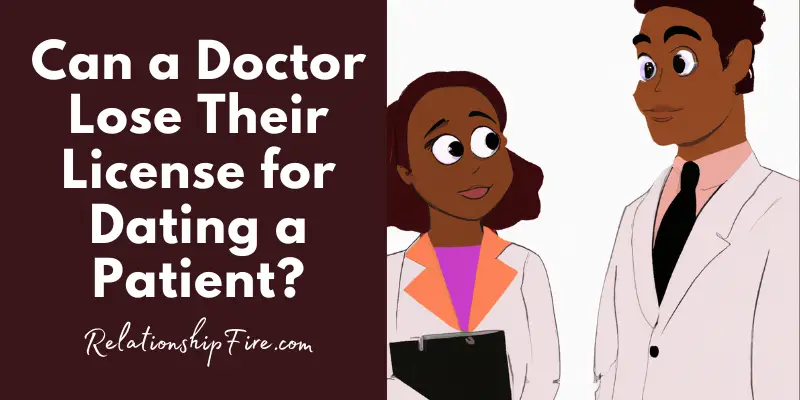Navigating the complex world of healthcare ethics can be a challenging task.
One area that often raises questions involves the boundaries of the doctor-patient relationship.
Can a doctor lose their license for dating a patient?
A doctor can lose their license by dating a patient due to professional misconduct. The American Medical Association advises against such relationships because of potential harm to the patient and a breach of trust.
This article will delve into the ethical, legal, and professional issues surrounding romantic relationships between doctors and patients.
The Ethical Implications of Doctor-Patient Relationships

Healthcare professionals have a duty to maintain professional boundaries with their patients.
This obligation is crucial in preserving the trust and confidence integral to the doctor-patient relationship.
The American Medical Association (AMA) has clear guidelines on romantic relationships with patients.
According to the AMA, “A physician must terminate the patient-physician relationship before initiating a dating, romantic, or sexual relationship with a patient.”
This principle is rooted in several key ethical concerns:
- Power imbalance. The doctor-patient relationship is inherently unequal. Doctors hold significant power due to their access to sensitive personal information and their role in making important healthcare decisions. This power imbalance could make it difficult for a patient to refuse or end a romantic relationship with a doctor.
- Trust and objectivity. Doctors are expected to maintain professional objectivity when treating patients. A romantic relationship could compromise this objectivity, affecting the quality of care provided.
- Confidentiality. The confidentiality of patient information might be at risk in a romantic relationship, particularly if the relationship ends badly.
Besides these, the potential for harm to the patient is always present in such a scenario.
The doctor, being in a position of authority and trust, can influence the patient’s decisions and actions, which may not be in the patient’s best interests.
Also, the emotional turmoil resulting from a potential breakup can adversely affect the patient’s mental health.
How the Doctor-Patient Relationship Can Affect Informed Consent and Confidentiality
Informed consent and confidentiality are two cornerstones of medical ethics.
Both can be significantly impacted if a doctor initiates a romantic involvement with a patient.
You must consider:
- Informed Consent. This principle requires that patients understand and agree to their treatment plans. A romantic relationship could cloud a patient’s judgment or cause them to feel pressured into agreeing with the doctor’s recommendations.
- Confidentiality. Doctors are bound by law and ethics to maintain the confidentiality of patient information. In a romantic relationship, this boundary could be blurred, potentially leading to inappropriate disclosure of personal health information.
The erosion of these principles can lead to a significant decline in the quality of care.
Patients might hesitate to disclose necessary information for fear of personal implications.
Moreover, a doctor emotionally involved with a patient might find it challenging to maintain a clear perspective, leading to potential medical errors or misjudgments.
Legal and Professional Ramifications for Doctors Who Engage in Romantic Relationships with Patients
Doctors who engage in romantic relationships with patients can face severe legal and professional consequences.
These can include:
- Loss of license. Medical boards can revoke a doctor’s license for unprofessional conduct, including inappropriate relationships with patients.
- Malpractice lawsuits. If a patient feels they received substandard care due to the relationship, they may sue for malpractice.
- Damage to reputation. Even if no legal action is taken, the doctor’s professional reputation could be irreparably damaged, affecting their ability to practice medicine.
The seriousness of the consequences can vary based on different factors, such as the doctor’s field of expertise, how long the relationship lasted, and if the relationship affected the patient’s medical treatment.
However, the fact remains that any such relationship carries a significant risk of professional consequences, regardless of the specifics.
Can a Doctor Flirt with a Patient?
While the AMA guidelines do not specifically mention flirting, it is generally considered unprofessional behavior that could breach boundaries and lead to an inappropriate relationship.
It’s crucial for doctors to maintain a professional demeanor at all times to avoid any misunderstanding or discomfort.
Moreover, flirting could make patients feel uncomfortable or pressured, which can negatively impact the trust essential to the doctor-patient relationship.
Doctors must be aware of how their words and actions are perceived and strive to foster a safe and respectful environment for their patients.
Are Doctors Allowed to be Friends with Patients?
Friendships between doctors and patients are not explicitly forbidden by most professional guidelines.
However, they can still complicate the professional relationship and potentially lead to ethical dilemmas. Doctors should always maintain professional boundaries and avoid situations that could compromise their objectivity or the patient’s comfort.
In fact, some doctors may even argue that friendships can enhance the therapeutic relationship by building trust and understanding.
However, it is vital to remember that a friendship should not compromise the doctor’s professional judgment or the patient’s autonomy.
Do Doctors Get Emotionally Attached to Patients?
Doctors are human beings and may naturally feel empathy and compassion for their patients.
However, it’s essential to distinguish these feelings from a deeper emotional attachment that could impact their professional judgment.
Doctors are encouraged to seek support and guidance when dealing with emotionally challenging cases to ensure they maintain professional boundaries and deliver the best possible care.
However, it’s important to remember that emotional attachment can blur the lines of professionalism, leading to potential ethical and legal pitfalls.
Doctors need to ensure that their emotions do not cloud their professional judgment or lead to inappropriate relationships.
Is it Legal for a Doctor to Fall in Love with a Patient?
Falling in love, in itself, isn’t illegal.
However, acting on those feelings by initiating a romantic relationship with a patient while they are under the doctor’s care can have significant professional and legal implications.
The AMA’s guidelines strongly advise against such relationships due to the potential for harm to the patient and the inherent power imbalance.
It’s also worth noting that society generally frowns upon such relationships, considering them unprofessional and unethical.
Patients seek medical help with the expectation of receiving impartial, objective care.
Romantic relationships with doctors can compromise this expectation, leading to a loss of trust in the healthcare system.
Can I Ask My Doctor On a Date?
While patients are not bound by the same professional ethics as doctors, asking your doctor on a date could put them in a difficult position.
It’s best to avoid crossing professional boundaries in this way.
If you find yourself with strong feelings for your doctor, it may be best to seek care from a different healthcare provider to avoid potential ethical issues.
When patients develop romantic feelings for their doctors, it can be a sign of transference, a psychological phenomenon where the feelings a person has towards their doctor become confused with romantic love.
It’s essential for patients to recognize this and discuss it with a counselor or therapist.
How Long Does a Doctor Have to Wait to Date a Patient?
The AMA doesn’t provide a specific timeline for when it’s acceptable to date a former patient.
However, many healthcare professionals agree that a significant amount of time should pass before a doctor considers dating a former patient.
The key is ensuring the professional relationship has been completely terminated and that there’s no likelihood of the patient needing the doctor’s professional services in the future.
Different jurisdictions may have different rules regarding this issue.
Some may require a cooling-off period of a few years, while others may be more lenient. However, the onus is on the doctor to ensure they are acting ethically and not exploiting their former professional relationship for personal gain.
Ethical Ways for Doctors and Patients to Build Positive Relationships Without Crossing Boundaries
Building a positive doctor-patient relationship is essential for effective healthcare.
Here are some tips for doing so without crossing ethical boundaries:
- Maintain Professionalism. Always interact in a professional manner. Avoid discussing personal matters or behaving in a way that could be perceived as overly familiar.
- Respect Boundaries. Understand and respect the patient’s personal boundaries. This includes maintaining their privacy and avoiding unnecessary physical contact.
- Communicate Effectively. Clear, honest, and empathetic communication can help build trust and rapport without crossing ethical lines.
- Show Empathy. Demonstrating understanding and compassion can help patients feel valued and respected without compromising professional boundaries.
- Seek Guidance. If a doctor feels unsure about a situation, they should seek advice from a trusted mentor or an ethics committee.
Additionally, it is important to regularly remind oneself of the primary goal of the doctor-patient relationship – to provide the best possible care for the patient.
Keeping this goal in mind can help doctors navigate complex emotional situations without compromising their professional duties.
Here is a video about doctors dating patients:
Final Thoughts: Can a Doctor Lose Their License for Dating a Patient?
In the end, while doctors are human and can experience a range of emotions, including attraction, they must always prioritize their patients’ welfare and the integrity of the medical profession.
It’s vital to uphold the ethical standards that govern the doctor-patient relationship to maintain trust, objectivity, and the highest quality of care.
These standards are in place not only to protect patients but also to protect the professionals themselves from potentially harmful situations that could compromise their careers and personal life.
Related posts:
